- Home
- Jerry B. Jenkins
I, Saul Page 3
I, Saul Read online
Page 3
Paul had always been a small man, but when Luke met him decades before, he was wiry, muscular, athletic. Until this last imprisonment, he had still shamed men half his age with his firm grip, his ability to walk prodigious distances, even his capacity to run when necessary. And that had been all too frequently.
But now the man was wasting away. Barely two years older than Luke, Paul finally looked every one of his sixty-five-plus years. Bones protruded, his grip was weak, and he sat with shoulders slumped. Luke used his foot to slide the waste bucket to the corner, which did nothing to lessen the odor. “Don’t forget to return that to within reach before you leave,” Paul said. “Things are bad enough as it is.” He had not been bathed, and he told Luke that what was left of his garments served also as bedding.
Luke pulled food from his pockets, and Paul grabbed the bread, tearing at it with his teeth and gasping as he chewed and swallowed and offered thanks for it, seemingly all at the same time: “… give us this day our daily bread and forgive us our trespasses ….”
“Slow down, friend. Don’t make yourself ill.”
“Too late,” Paul said with a wan smile, now munching figs. “I’m starving on prison rations.”
“How are you sleeping?”
Paul shrugged. “You woke me.”
“But after how long?”
“It’s hard to tell here, Luke. Around midday, a sliver of sunlight squeezes through the cleft in the ceiling there from street level. It casts a dim beam low on the wall behind me and in twenty minutes or so travels across the floor before it disappears. My ration of cold broth is lowered to me just after that. I sit in darkness again then, praying and singing. I feel worthless, yearning to preach. I ask about the other prisoners and wish they could hear me. I would tell them of Christ. But I hear them only when they scream, and I no longer have the power to shout loud enough for them to hear me. The guards no longer listen to me, and when they did they refused to repeat my messages to the others. They tell me to save my breath, that the others are dying long before their executions can be carried out. You must not let that happen to me, Luke. You must not.”
Luke paced in the suffocating space. “But it was you who so eloquently wrote and preached about death. ‘To live is Christ,’ you said, ‘and to die is gain.’”
“I’m not fighting death, friend. You above all know that. But I want my end to bring glory to God, to my Savior. Fortunately, they cannot decapitate a Roman citizen inside the city. They must take me out—oh, how I long for the light! But far more, I long for ears to hear me. I am desperate for any audience, Luke. But now that you are here, before long I will preach to you! Poor, dear friend, you have heard it all before.”
“I never tire of it, especially from you.”
“But don’t let me die without one more opportunity to proclaim the good news.” Luke felt Paul’s weak eyes on him. “You feel I’m asking too much.”
“Of course you are! How can I not feel the weight of it! People died today despite my efforts. I prayed for them, ministered to them, tried everything I knew. That’s all I have to offer you as well.”
“I must insist, Luke ….”
“You’re like a dog with its teeth on the hem of a garment.”
“But my motive is pure. I don’t want to just keep the attention of my master. I want once more to bring glory—.”
“I know what you want to do, Paul! I know! And I came to do everything in my power to grant your wish. But you know what that means?”
“That Christ will be preached, God will be glorified, hard hearts will hear.”
Luke faced his friend. “It means I will have to be there.”
Paul cocked his head. “Why, yes, certainly. Why would you have come if I couldn’t count on you? Now that you have found me, surely you wouldn’t dream of abandoning me to such a fate alone.”
Luke sat and shook his head.
“My friend,” Paul said, “get word to Timothy and Mark to do whatever they have to do to get to me. It will take weeks for Timothy to get here from Ephesus, and I’m not even sure where Mark is. Perhaps they too can be with me at my last.”
“None of us could ever abandon you, Paul. But must we watch as—.”
“Rome cannot sever my soul. You can rest in the blessed hope that being absent from my body means I am present with my Lord. What glory that will be!”
“For you.”
“For you, too! Your time will come, Luke, and we will rejoice in paradise forever.”
Luke wanted with all his being to agree, but he could not push from his mind the image of his closest friend in the world facing a monstrous sword in the hands of an executioner, riving his head from his body.
“Tell Timothy and Mark to bring my cloak, and the books, and above all the parchments.”
Luke squinted at Paul. “‘Above all’?”
“Yes, the parchments.”
Luke was fascinated that the fearless apostle seemed unable to hold his gaze. “What are you not telling me?”
Paul reached for Luke’s garment and desperately drew him close, whispering hoarsely, “Those parchments contain my memoir, Luke. And I name names. Much of the church would be exposed if they fell into the wrong hands. I must have them, and you must help me finish them. But we have to guard them with our very lives.”
3
Truth
TEXAS
Through two more final exams Augie sat as close as he could to the ancient window air conditioning units that rattled and hummed, trying to keep pace with the naked sun. Students proved creative, refilling their water bottles from the drinking fountain, then filling their palms and dousing their faces, some even running wet hands through their hair.
Augie had cured his students of whining early in the term, and they knew better than to start. “No life is messier than one in ministry,” he told them. “Whiners won’t last.” Fortunately, everyone seemed eager now to just get through their finals and either graduate or get home to prepare for next year.
By the middle of the afternoon Augie had been agonizing for hours over Roger Michaels. What could be so urgent? Finally back in his office, Augie wanted to start grading the exams in case he had to leave the country in a hurry, but first he got online to find flights from DFW to DaVinci-Fiumicino. The next with an open seat was scheduled to leave two days later, Friday the 9th, at 10:30 a.m. with a stopover in Chicago, before arriving in Rome just before 8:00 a.m. Saturday.
Unfortunately, only first class was available, at almost $4,000. And with no idea what he was getting himself into in Rome, Augie would have to leave his return flight open—which could be even more exorbitant.
Even if he found the money, what if he couldn’t make it back in time to start his summer-school class? What would he tell Les Moore?
Grading couldn’t wait. He owed that to the students. As he gazed at the stack of blue books, Augie wondered if he could set aside his anxiety over Roger and the prospect of a trip that would totally complicate his life.
Augie would eventually give each blue book its due, but now he just leafed through to sample the essays on the question of Paul’s thorn in the flesh. Many suggested various physical ailments, as well as depression, divorce, a lost love, doubt, even a secret battle with homosexuality. Augie stopped at that one, curious whether the student presented a convincing case. Primarily Augie looked for evidence that a student recognized that Paul’s thorn was—as the evangelist himself had written—not of God but of Satan (“a messenger to buffet me”). For if it had been given to him by God, why would Paul have prayed three times that it might depart?
When a bead of sweat rolled from Augie’s forehead onto the paper, he rose to lower the blinds and caught a glimpse of one of his Greek students in the parking lot.
Rajiv Patel, a brilliant twenty-five-year-old from Ahmadabad, India, seemed laden with more than his backpack as he trudged to his dilapidated Toyota in the blistering heat. He unlocked it, then stood staring at the ground.
Augie had long been taken with the sweet spirit of the soft-spoken student. Rajiv had shared pictures of the ministry he had left in India to seek more formal training. He had labored in squalor, sharing the gospel with the lowest castes. And unlike many foreign students whose eyes had been opened to the advantages of staying in America upon graduation, Rajiv had no such intentions. Even here he busied himself ministering to the poor during his off hours and was committed to returning home after one more year of study.
Rajiv finally opened his car door, yanking his hand from the handle, which must have burned him. Shimmering heat waves poured from the car. Rajiv slung his backpack into the backseat and removed the reflective shade from the windshield. He leaned in and started the engine, then shut the door to let the car cool, leaving the driver’s side window open about an inch. Augie guessed the old car’s AC would lower the temperature a mere ten degrees.
Rajiv stood shading his eyes, looking defeated by more than the heat. Finally the young man slid into the car, but rather than drive away, he rested his forehead on the steering wheel. Soon he appeared to be pounding the wheel, before finally burying his head in his hands.
Augie hurried outside, hair soaked and shirt clinging. When he reached Rajiv’s car and tapped on the window, the Indian was clearly startled.
“You all right?” Augie said.
Rajiv nodded, tears rolling.
“May I sit with you?”
Rajiv unlocked the passenger door and was wiping his face when Augie slid in. He aimed an AC vent toward his face but still felt as if he were in an oven. “Would you rather talk in my office?”
“No, thank you, Doctor,” Rajiv said in his native lilt. “I must be going soon.”
“What’s wrong, Rajiv?”
“I’m trying to have faith. But I have exhausted my funds. One year to go and my country so needy. But I cannot even enroll for the fall.”
Augie quizzed him about all the avenues for financial aid, grants, and scholarships. Sure enough, Rajiv was atop all of them, and he had accumulated every cent available.
“How short are you?”
“Almost four thousand dollars.”
Augie flinched. His first thought was to tell Rajiv that he would pray for him. But knowing the young man, there would have been no lack of prayer. In an instant it came to Augie that he might be the answer. “Have you got a piece of paper, Rajiv?”
The student wrenched around to reach into his backpack, handing his professor a spiral notebook.
Augie wrote, “To whom it may concern: Please charge the balance of Rajiv Patel’s school bill to me for up to four thousand dollars. Dr. Augustine A. Knox.”
Rajiv stared at the sheet and burst into tears anew. “I cannot accept this, Dr. Knox! You can’t afford it!”
“If God wants me to do something, don’t you think He’ll make it happen?”
“Well, yes, but—.”
“You think I just happened to look out my window when you needed me?”
“I certainly did not intend to make you feel—.”
“Rajiv! Tell me you’re not going to deprive me of this blessing.”
“I’m sorry?”
“You heard me,” Augie said, opening the door. “Remember, that’s up to four thousand dollars. I’m pledging only to make up the difference between what you need and what you can earn or raise. I expect you to keep doing your part. Now let me out of this hotbox.” “I will never be able to thank you enough!”
“Not another word about it. We’re here to train kingdom laborers, not send them home before they’re ready.”
Augie settled back behind his desk wondering what in the world he had done. The timing couldn’t have been worse. Where was he going to come up with the money? Lord, he said silently, give me the faith You gave Rajiv to believe this was of You. I’ll trust You to provide.
Augie had never seen such a fast change in the weather, especially in Arlington. Huge, roiling black clouds blew in so quickly from the west that temperatures plummeted into the 90s and flashes of light appeared on the horizon. By the time he reached US 30 heading east, the sky was black and lightning struck within a few hundred feet of the highway. The ferocious thunder was so loud it hurt Augie’s ears and wind rocked the car. When the heavens opened and the rain came in sheets, Augie’s wipers couldn’t keep up, and visibility plunged to zero. Like everyone else, he was forced to pull over and wait it out.
With no idea how long he would be delayed, Augie was tempted to call Sofia right then, but the storm would probably keep him from getting through. He and Sofia loved to discuss their future, marriage, kids, even where they might live. Her parents had only recently realized that their friendship had blossomed into something serious.
“Daddy’s cautious,” she had told him, admitting that her father insisted it was way too soon for either of them to be “getting ideas.” Augie deduced that Malfees Trikoupis was not yet ready for anyone to ask for his daughter’s hand. Amusing, because Augie and Sofia had known each other for years as long-distance friends before moving to the next level during a tour that ended in the red-rock city of Petra.
When he was thirty, Augie had met Mr. and Mrs. Trikoupis even before he met Sofia, when the tour group gathered in the lobby of the King David Hotel in Jerusalem at the beginning of a Holy Land tour. The understated but elegantly dressed couple exuded wealth and sophistication, and Mrs. Trikoupis mentioned that their daughter was with them but that she had begged off from socializing that first night, knowing she would be the youngest member of the tour group that had congregated from around the world.
Mr. Trikoupis, dark and stocky with a shock of wavy white hair, seemed immediately taken with Augie when Roger Michaels introduced him as the host of the trip. “Young Dr. Knox knows the Book,” Roger had boomed, lips hidden by his prodigious beard.
Mr. Trikoupis had excused himself and led Augie to a corner. “Perhaps this week you can infuse my daughter with a bit of an interest in antiquities, my field,” he said, carefully enunciating in what was clearly a second language for him. “Sofia is a senior at the University of Athens majoring in modern art, but I would love for her to work in my business one day.”
“Your business?”
“I am an importer-exporter dealing in antiquities. I have many shops in Greece, the largest near our home in Thessaloniki.”
“Oh!” Augie had said. “You’re that Trikoupis! I’ve been in a Tri-K shop or two of yours. So nice to meet you.”
Augie had caught his first glimpse of the radiant Sofia at breakfast the next morning, and her energy alone made him feel old. Her jet hair and huge blue eyes captivated him, and he was struck by her firm handshake and eagerness to get on with the day. He had been miserable on his first such tour.
Her father had immediately monopolized Augie’s time, and it was only near the end of that week that he’d had a chance to chat with Sofia—she had been impressed by his facility with both ancient and modern Greek—and trade e-mail addresses.
For the next few years they communicated sporadically between continents, getting to know each other via the Internet and seeking each other’s advice about family and even relationships. She would send photos and resumes of her suitors and Augie would do the same with his miscellaneous dates.
Sofia had upset her father by remaining in Athens after graduating and becoming active in her church and career. “Augie,” she had transmitted one night, “who wants to work for their father? Oh, sorry, you work for yours, don’t you?”
“In a manner of speaking,” he had written back. And somewhere along the line Augie became comfortable enough with the Greek beauty that he opened up about the most difficult relationship in his life. Sofia was far enough away that he felt free to express things he had never told anyone.
“I teach in his department, yes, but we don’t talk. I’d love to think he was proud of me for following in his footsteps, but we are so unlike each other. May it ever be so.”
“I must know what you’
re talking about, Augie. I really do care, you know. I won’t pester you, but please know you can confide in me. But only if you trust me, and only if you wish.”
One late night (the following morning her time) she suddenly confessed that she was considering going home to work for her father. She had been working in a fine-arts store and teaching evening classes, but, she said, despite many friends and a good church family, she felt lonely. “I don’t date guys who don’t share my faith,” she wrote. “But even the Christian guys seem to have only sex on their minds. I miss my family.”
“Funny,” he wrote, “I miss the father I never had.” “You don’t see him every day?”
“Of course. But he doesn’t see me.”
The rain finally began to abate, so Augie carefully followed the other motorists back out onto the highway. When he reached Dallas Theological an hour later, Biff Dyer’s ramshackle van was pulling out. Augie honked and Biff stopped next to him. “I told you I wasn’t gonna deliver, Augie, and my day is over.”
“I’ll owe you, Biff, but you’ve got to give me a few minutes.”
Biff parked and slammed his door, striding back toward his office looking none too happy. Augie caught up and explained that he had been delayed by the storm. “This phone thing is critical, Biff. You know I’d never take advantage of you.”
“You never have before. But it’s my wife’s birthday and I—.”
“I won’t take a minute longer than necessary.”
Augie loved Biff’s space. Behind a plain, efficient office sat a windowless chamber lined with shelves jammed with every electronic gadget imaginable. Biff outfitted the DTS faculty—and much of Arlington’s—whenever they went overseas. Biff himself had gone only twice himself, but he’d met Roger Michaels. “Everybody’s favorite,” he said. “So what’s up with him?”

 The Betrayal
The Betrayal The Valley of Dry Bones
The Valley of Dry Bones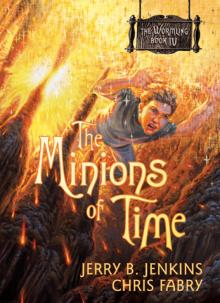 The Minions of Time
The Minions of Time Wild Rescue
Wild Rescue Though None Go with Me
Though None Go with Me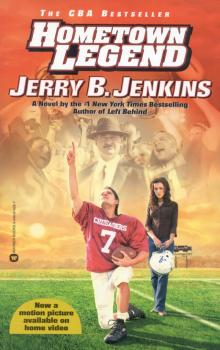 Hometown Legend
Hometown Legend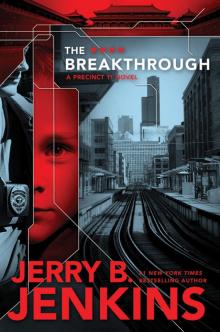 The Breakthrough
The Breakthrough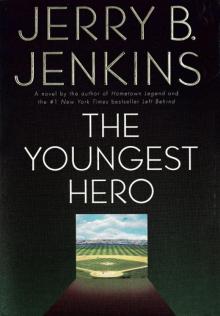 The Youngest Hero
The Youngest Hero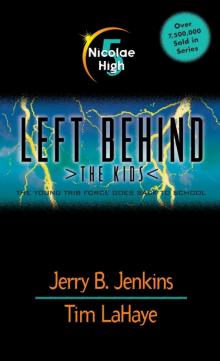 Nicolae High
Nicolae High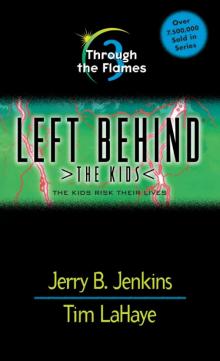 Through the Flames
Through the Flames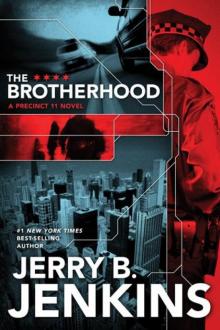 The Brotherhood
The Brotherhood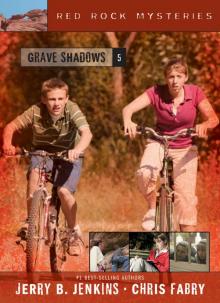 Grave Shadows
Grave Shadows The Changeling
The Changeling Shadowed
Shadowed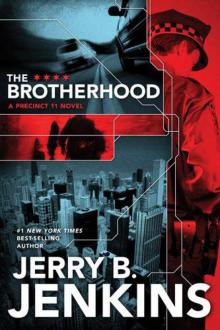 Precinct 11 - 01 - The Brotherhood
Precinct 11 - 01 - The Brotherhood Second Chance
Second Chance Silenced
Silenced The Vanishings
The Vanishings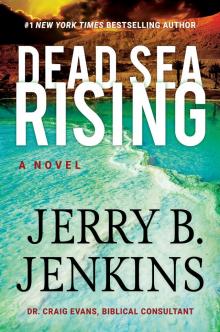 Dead Sea Rising
Dead Sea Rising Soon
Soon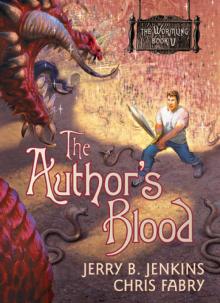 The Author's Blood
The Author's Blood The Sword of the Wormling
The Sword of the Wormling Left Behind - The Kids 02 - Second Chance
Left Behind - The Kids 02 - Second Chance Haunted Waters
Haunted Waters The Underground
The Underground Mark's Story
Mark's Story Shaken
Shaken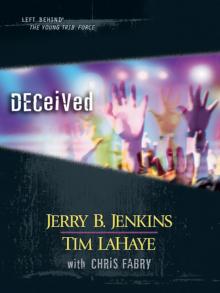 Deceived
Deceived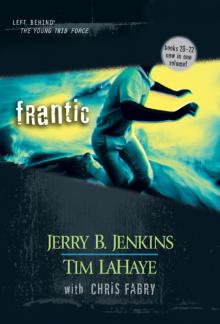 Frantic
Frantic Riven
Riven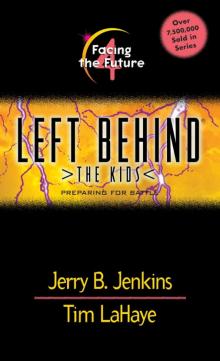 Facing the Future
Facing the Future Stung
Stung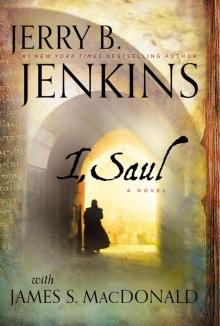 I, Saul
I, Saul Hunted
Hunted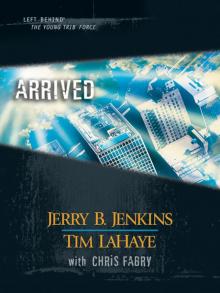 Arrived
Arrived John's Story
John's Story Stolen Secrets
Stolen Secrets